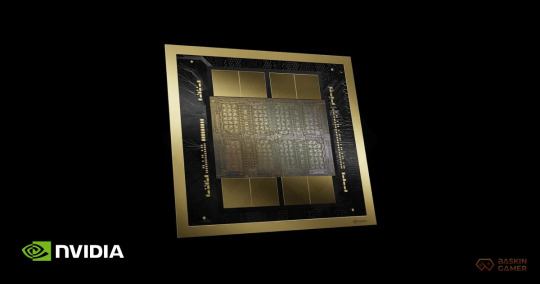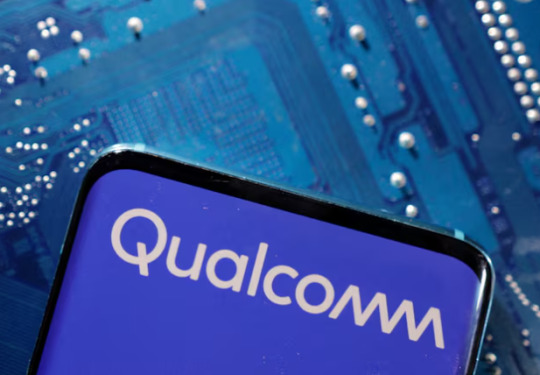#AIchips
Explore tagged Tumblr posts
Text
🔊Get Research Study on AI Chip Market
On September 4th, we announced our research study AI chip refers to a specialized integrated circuit tailored for efficient and fast execution of AI tasks. These chips are purposefully crafted to expedite intricate algorithmic calculations, crucial for various AI applications. They harness parallel processing abilities, unique neural network architectures, and optimized memory structures to achieve remarkable performance improvements compared to general-purpose processors.
How did the AI 'IMPACTING“ Semiconductor Industry ?
The artificial intelligence chip market size is segmented into Chip Type, Processing Type, Technology, Application and Industry Vertical.
Who are the Top Contributing Corporations?
Major Key Players:
MediaTek Inc,
Qualcomm Technologies Inc.,
Advanced Micro Devices Inc.(Xilinx Inc.),
Alphabet Inc.,
Intel Corporation,
NVIDIA Corporation (Mellanox Technologies),
Samsung Electronics Co Ltd,
Baidu,
SoftBank Corp.
According to the insights of the CXOs of Leading Companies Simply Click here or email us at [email protected] with the following for more information:
Increased demand for artificial intelligence chips
AI chip market is seen as promising for the technological industry's future
Investments in AI start-ups and the development of quantum computers
Today and Be a Vital Part of Our Thriving Community!
Great! Follow the steps below:
Reblog this post
Share this information with a friend
Follow @amrresearchstudy for more information.
#TechMarket#AIStartups#AIResearch#TechInvestment#FutureTech#ChipDesign#TechTrends#InnovationHub#SmartTechnology#AIIndustry#ArtificialIntelligence#AIHardware#Semiconductor#AIChips
4 notes
·
View notes
Text
#ArtificialIntelligence#edge computing#Semiconductors#AIChips#TechForecast#SmartDevices#EdgeComputing#MarketInsights#TimesTech#DeepTech#electronicsnews#technologynews
0 notes
Text
Intel made a HUGE Mistake… and Nvidia ran Away with ai | Ai Vault
youtube
Join us as we explore why two of the biggest tech giants, Intel and Samsung, are struggling to keep up in the AI revolution. Once leaders in the semiconductor industry, both companies have found themselves falling behind in the race for AI supremacy, with competitors like Nvidia and TSMC taking the lead. From missed opportunities to manufacturing delays, we’ll dive deep into the factors that have led to their struggles and what this means for the future of AI hardware.
#aiwar#intelstruggles#samsungfail#nvidiaai#chipwars#aichips#aihardware#intelvsnvidia#aiinnovation#aifuture#chipbattle#aiindustry#taiwan#tsmc#china#Youtube
0 notes
Link
0 notes
Text
Nvidia's leadership in AI chip technology has propelled it past Microsoft, highlighting the broader AI boom reshaping the tech industry.
0 notes
Text
Revolutionizing AI at the Edge
In this week’s special edition of “News You Can Use” on HealthcareNOWRadio I sat down with Dinakar Munagala, CEO of Blaze, to explore the company’s remarkable journey from a garage startup to a NASDAQ-listed pioneer in Edge AI. Real-Time AI Where It Matters Most – The Edge Dinakar shares his background in chip design at Intel, where he contributed to graphics processors for Apple and Intel…

View On WordPress
#AIatTheEdge#AIchips#AIhardware#AIinHealthcare#AIrevolution#AIstartups#AItechnology#AssistiveAI#BlazeAI#DigitalHealth#EdgeAI#EdgeComputing#FutureOfAI#HealthcareInnovation#healthtech#medicalAI#NASDAQ#RealTimeAI#SmartHealthcare#TechForGood
0 notes
Text
📉 US AI Chip Export Restrictions Are Reshaping Global Tech Trade in 2025

In 2024, the U.S. exported $57.5 billion worth of AI chips — but 2025 brings new challenges and tighter control: 📦 China = 25% of all AI chip exports 🔒 Licensing rules + country-tier system 🌍 UAE signs a new free-trade AI chip deal 🏭 Nvidia, Intel, AMD face big market shifts 📊 Global supply chains & AI innovation at risk
🔗 Full blog + exporter data: 👉 usimportdata.com/blogs/us-ai-chip-export-restrictions-2025
0 notes
Text

NVIDIA Shocks the Tech World with New AI Chips and Unbelievable Revenue Surge - Baskingamer
NVIDIA has just made waves across the tech industry—again. At a recent event, the company… read more https://baskingamer.com/nvidia-shocks-the-tech-world-with-new-ai-chips-and-unbelievable-revenue-surge/
#NVIDIA#aichips#nvidiageforce#nvidiaaichips#gamechips#game#gaming#GamingContent#gamers#games#gamer#gamingcommunity#xbox#gamingnews#baskingamer#techstocks#companies#finance
0 notes
Text
Qualcomm Teams Up with Nvidia to Develop Custom Data Center CPUs for AI Workloads

Qualcomm is making a bold return to the data center CPU market — this time with a strategic partnership involving none other than AI giant Nvidia. On Monday, Qualcomm announced plans to build custom central processing units (CPUs) designed to seamlessly connect with Nvidia’s powerful AI chips, leveraging Nvidia’s technology to accelerate communication between processors.
Qualcomm’s Comeback in Data Center CPUs
In the 2010s, Qualcomm first ventured into the data center CPU space with an Arm-based chip tested alongside Meta Platforms (formerly Facebook). However, the project was shelved due to corporate cost-cutting and legal hurdles. Now, after acquiring a talented team of former Apple chip designers in 2021, Qualcomm is reigniting its data center ambitions.
Last week, Qualcomm signed a letter of understanding with Saudi Arabian AI firm Humain to collaborate on a custom data center CPU, signaling its serious intent to compete in this space.
Why Nvidia Technology Matters
Nvidia dominates the AI chip market primarily with its GPUs, which are paired with CPUs from Intel, AMD, and now potentially Qualcomm. Nvidia has also stepped into the CPU arena with its Arm-based “Grace” processor designed specifically for AI workloads.
Qualcomm’s new CPUs will utilize Nvidia’s technology to enable high-speed, efficient communication with Nvidia GPUs. This connection is crucial for building the high-performance, energy-efficient data centers that today’s AI applications demand.
Cristiano Amon, Qualcomm’s CEO, emphasized the importance of this synergy: "With the ability to connect our custom processors to Nvidia's rack-scale architecture, we're advancing a shared vision of high-performance energy-efficient computing to the data center."
What This Means for the AI and Data Center Markets
This collaboration marks a significant shift in the data center CPU landscape. Qualcomm’s re-entry, combined with Nvidia’s interconnect technology, could challenge incumbents Intel and AMD while boosting the performance and efficiency of AI infrastructure.
By enabling tighter integration between CPUs and AI-focused GPUs, the partnership aims to accelerate AI model training and deployment—key for industries relying on artificial intelligence breakthroughs.
Looking Ahead
Qualcomm’s move to create custom CPUs optimized for Nvidia’s AI chips reflects the rapidly evolving demands of AI computing. As AI workloads grow more complex, the need for closely integrated, efficient hardware systems becomes critical.
With Nvidia pushing the envelope on AI GPUs and interconnects, and Qualcomm bringing decades of CPU expertise back to the data center, the AI hardware ecosystem is poised for exciting innovations in the years ahead.
1 note
·
View note
Text
Intel made a HUGE Mistake… and Nvidia ran Away with ai | Ai Vault
youtube
Join us as we explore why two of the biggest tech giants, Intel and Samsung, are struggling to keep up in the AI revolution. Once leaders in the semiconductor industry, both companies have found themselves falling behind in the race for AI supremacy, with competitors like Nvidia and TSMC taking the lead. From missed opportunities to manufacturing delays, we’ll dive deep into the factors that have led to their struggles and what this means for the future of AI hardware.
0 notes
Text
Jeff Bezos Backs Tenstorrent in $700M Bid to Challenge Nvidia’s AI Chip Dominance.
Jeff Bezos Backs Tenstorrent in $700M Bid to Challenge Nvidia’s AI Chip Dominance. Nvidia’s dominance in the artificial intelligence (AI) chip market is under fresh scrutiny as Tenstorrent, a Santa Clara-based startup, secures a $700 million funding round backed by Amazon founder Jeff Bezos through Bezos Expeditions. Valued at $2.6 billion, Tenstorrent aims to disrupt Nvidia’s near-monopoly with…
0 notes
Text
#AI#Semiconductors#AdvancedPackaging#ChipletDesign#HeterogeneousIntegration#3DIC#FMI#AIChips#TechInnovation#Microelectronics#Timestech#HighPerformanceComputing#5GTech#PackagingTrends#electronicsnews#technologynews
0 notes
Text
Intel made a HUGE Mistake… and Nvidia ran Away with ai | Ai Vault
youtube
Join us as we explore why two of the biggest tech giants, Intel and Samsung, are struggling to keep up in the AI revolution. Once leaders in the semiconductor industry, both companies have found themselves falling behind in the race for AI supremacy, with competitors like Nvidia and TSMC taking the lead. From missed opportunities to manufacturing delays, we’ll dive deep into the factors that have led to their struggles and what this means for the future of AI hardware.
#aiwar#intelstruggles#samsungfail#nvidiaai#chipwars#aichips#aihardware#intelvsnvidia#aiinnovation#aifuture#chipbattle#aiindustry#taiwan#tsmc#china#Youtube
0 notes
Text
How Does (etr:amd) Reflect Advances in Semiconductor Innovation?
Advanced Micro Devices, a prominent name in the global semiconductor industry, continues to capture market attention through strategic developments in AI technology and high-performance computing. As a competitor in the evolving semiconductor landscape, (etr:amd) reflects the company’s efforts in the AI chip segment and its influence within data center advancements. These initiatives have contributed to its presence in institutional portfolios and broader tech sector discussions, reinforcing its relevance in the world of semiconductors and advanced computing.
Semiconductor Leadership and Market Expansion
(Etr:amd) represents Advanced Micro Devices, which has positioned itself among key players in the semiconductor industry by advancing high-performance CPUs, GPUs, and AI-enabled hardware. As demand continues to expand across gaming, cloud computing, and AI workloads, the company has moved toward enhancing its product offerings to address both general-purpose and specialized computing requirements.
The release of its latest series of AI chips, aimed at supporting large language models and training-intensive applications, signifies the company’s intention to claim a stronger foothold in the competitive AI hardware segment. Through this evolution, (etr:amd) maintains relevance not only in equity discussions but also within the context of emerging technologies.
Strengthening Data Center Relevance
Data centers represent a vital business segment for the company. The growing volume of generative AI applications and cloud-native operations has elevated the importance of hardware optimization, where AMD’s processors offer energy efficiency and performance advantages.
Collaborations with major cloud service providers, as well as increasing adoption of the company’s products in hyperscale environments, contribute to its expanding presence in high-performance server infrastructure. The emphasis on scalable architecture, supported by custom solutions, strengthens alignment with enterprise clients seeking efficiency and adaptability. As such, (etr:amd) continues to feature prominently across institutional monitoring platforms.
Competitive Positioning in the GPU Market
The GPU market continues to play a central role in technological advancement, particularly in graphics-intensive tasks and machine learning acceleration. The company’s graphics portfolio has evolved to meet rising expectations in gaming, content creation, and AI-driven visual applications.
While the competitive landscape features dominant players, AMD has enhanced its capabilities by introducing architecture improvements, reduced power consumption, and developer-friendly ecosystems. These innovations support the company’s profile in discussions of semiconductor competitiveness and technological parity in the GPU domain. This sustained development contributes to keyword visibility for (etr:amd) across financial data services.
Strategic Developments and Industry Engagement
Recent strategic focus areas for the company include AI integration, power-efficient computing, and platform interoperability. Its acquisition of businesses specializing in adaptive computing has enabled the expansion of customizable AI solutions that align with modern enterprise needs. These developments have further reinforced the relevance of (etr:amd) in conversations surrounding scalable and intelligent semiconductor solutions.
Participation in industry-wide events and product showcases further supports visibility. The inclusion of advanced chipsets in both consumer-grade and enterprise-level devices amplifies brand recognition and ensures that (etr:amd) maintains consistent coverage across platforms analyzing semiconductor dynamics and tech sector performance.
Institutional Participation and Broader Tech Influence
The company has received attention from institutional participants due to its relevance in emerging technologies and diversified business units. In the broader context of the tech sector, its exposure to AI infrastructure, advanced GPUs, and enterprise computing places it among those shaping next-generation computing paradigms. As a result, (etr:amd) continues to surface in institutional research and global discussions surrounding technological innovation.
Presence across industry-tracking portfolios and thematic exchange-traded products focused on semiconductors and innovation contributes to ongoing relevance in structured financial strategies. This broad inclusion reinforces the role of semiconductor firms in shaping macroeconomic themes related to automation, data processing, and digital transformation. Consequently, (etr:amd) maintains a stable position within institutional screening models.
Global Visibility and Index Inclusion
The company’s visibility extends beyond domestic markets, supported by its inclusion in multiple international indices and global financial platforms. This exposure adds to the accessibility of the brand in both European and North American financial discussions, increasing engagement across international exchanges and data analytics services.
Such cross-market integration enhances its profile and supports broader coverage from analysts, industry trackers, and algorithmic models analyzing trends in semiconductors and the broader tech sector. Within this scope, (etr:amd) remains a frequently cited identifier in global semiconductor analysis.
Semiconductors and the Future of AI Integration
As AI continues to shape industry models, the company’s development of next-generation AI chips and machine learning frameworks positions it within a key segment of the evolving tech ecosystem. The ability to provide infrastructure that supports real-time analytics, inference modeling, and large-scale training creates relevance across multiple verticals.
The expanding reliance on edge computing and hybrid cloud models reinforces continued importance for semiconductor manufacturers prioritizing latency reduction, power efficiency, and multi-architecture support. These dynamics highlight the operational significance of (etr:amd) in facilitating AI-driven computing infrastructure.
Advanced Micro Devices, through its commitment to high-performance computing, AI acceleration, and energy-efficient design, maintains a strong position within the global semiconductor ecosystem. With innovation in AI chips, data center solutions, and GPU technologies, the company is not only addressing current computing demands but also influencing the architecture of modern digital environments. Continued presence across institutional platforms and the broader tech sector underscores the operational footprint of the company and the ongoing prominence of (etr:amd) in industry coverage.
0 notes